The 34th International Seminar on Security and Defence kicks off in Toledo: "Russia's aggression cannot be rewarded"

"Brain dead" was how French President Emmanuel Macron defined the state of the Atlantic Alliance in 2019. That diagnosis was obvious: the organisation's role had been in doubt since the fall of the Berlin Wall and the disintegration of the USSR. Only Vladimir Putin would be responsible for truncating the Elysée's projection three years later with the large-scale invasion of Ukraine. Now is the time for reflection, for re-founding the alliance and weaving a new strategic concept.
On Wednesday, Toledo hosted the inauguration of the thirty-fourth international seminar on security and defence organised by the Association of European Journalists (APE), an ideal setting with renowned speakers to rethink strategy. The first meeting in Toledo took place in 1983, two years after Spain joined NATO, making this the 40th anniversary just a few days before the annual summit in Madrid.

The journalist and Secretary General of the APE, Miguel Ángel Aguilar, introduced the opening session of the seminar with the Secretary General for Defence Policy (SEGENPOL), Admiral Juan Francisco Martínez Núñez, and the Minister of Finance and Public Administration of Castilla-La Mancha, Juan Alfonso Ruiz Molina.
"NATO has left existential anguish behind," Miguel Ángel Aguilar began. Macron's prediction failed thanks to Putin, who ultimately initiated an invasion that has been "the awakening of our conscience", stressed the journalist, who wanted to give rise to a reflection on the renewed role of NATO in this new scenario with the help of a "splendid" selection of experts in the academic, military and journalistic fields.
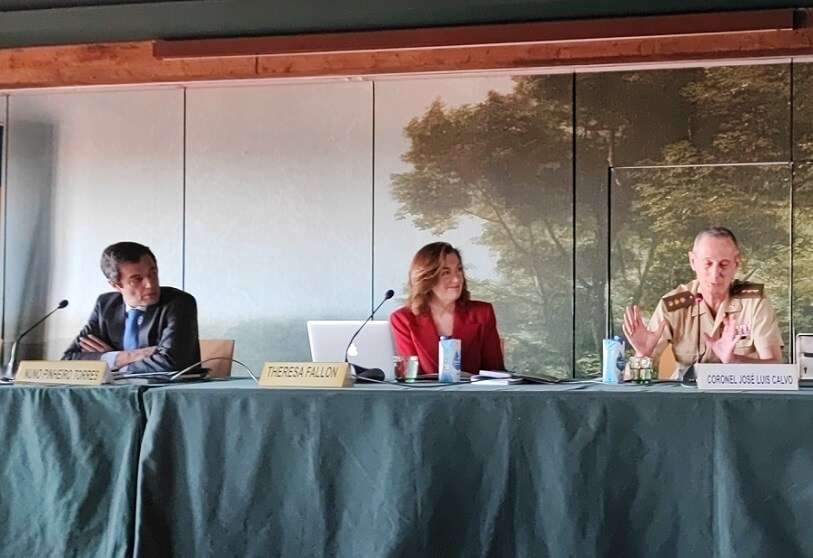
For Miguel Ángel Aguilar, the basic question, just a few days before the alliance's annual summit in Madrid, which marks four decades of NATO membership, is: what has Spain contributed to NATO and what has NATO contributed to Spain?
Admiral Juan Francisco Martínez Núñez said that "every war is a failure. It always is. And this failure is especially painful, first of all because we are confronted with cruelty in such close proximity. This terrifies us. The devastating cruelty in Europe is painful because we thought we had a solid security architecture in Europe". The successes, in the admiral's view, are that "we are helping the aggressor and avoiding escalation", the challenge now is to reduce as much as possible the catalytic effects, the economic and social consequences of war.

The SEGENPOL secretary general advocated looking beyond the ceasefire: "We must look for ways to find out how to reach a ceasefire. In this respect, the OSCE and the UN are limited because they are both judges and parties to the conflict". But he made it clear that the security architecture in Europe needs to be rebuilt: "Since the fall of the USSR it was done well, the scheme worked. There was trust". Now, trust seems impossible, which is why the admiral defended the theory of basing the new security architecture on mistrust. "Trust brings us closer to each other; distrust pushes us away. By distancing ourselves, we look for spaces in order to have more time," he said.
Martínez Núñez highlighted the return of the United States to Europe under the Biden Administration as essential to move forward on the challenges facing NATO. The admiral was unable to specify the content of the new strategic concept, but anticipated that it will look to the south and the other directions with intelligence and without the "self-absorption" characteristic of the Atlantic Alliance: "International organisations have their own personality", Martínez Núñez pointed out, before going on to say that there will be at least 120 important measures.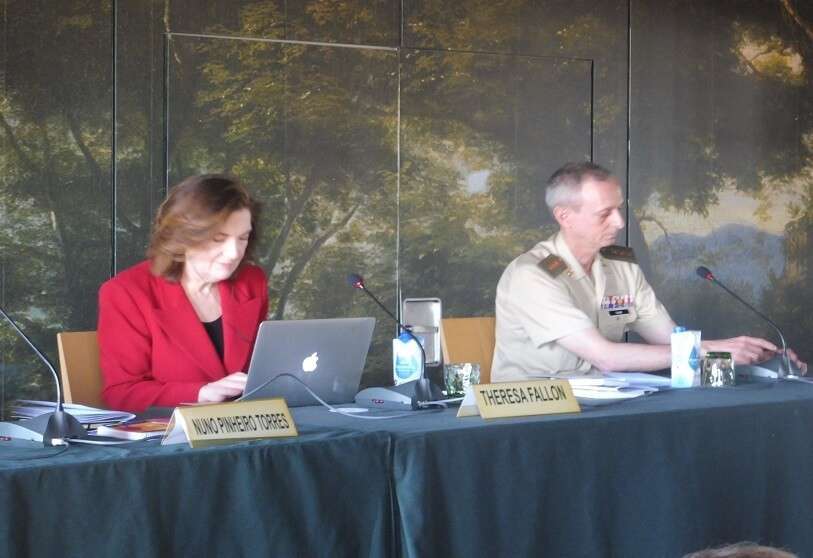
Ruiz Molina stressed as one of the positive aspects "the need to increase defence spending", in the case of Spain this has risen to 2% of GDP. "Doubling defence spending in the next 10 years. This makes us more secure and also generates employment and dual-use technology; it is an investment in R&D&I. We must also strengthen Europe's defence sector. To compete against the American arms industry. This should be seen as a synergy, not as a competition," said the Minister of Finance and Public Administration of Castilla-La Mancha.
Cadena Ser journalist Rafael Panero moderated the second session of the seminar to analyse Russia's military action. The panel included the intervention of the founder and director of the Centre for the Study of Russia, Europe and Asia (CREAS), Theresa Fallon, the head of the Security and Defence Coordination and Studies Division, Colonel José Luis Calvo, and Nuno Pinheiro Torres, former director of Defence Policy at the Portuguese Ministry of Defence.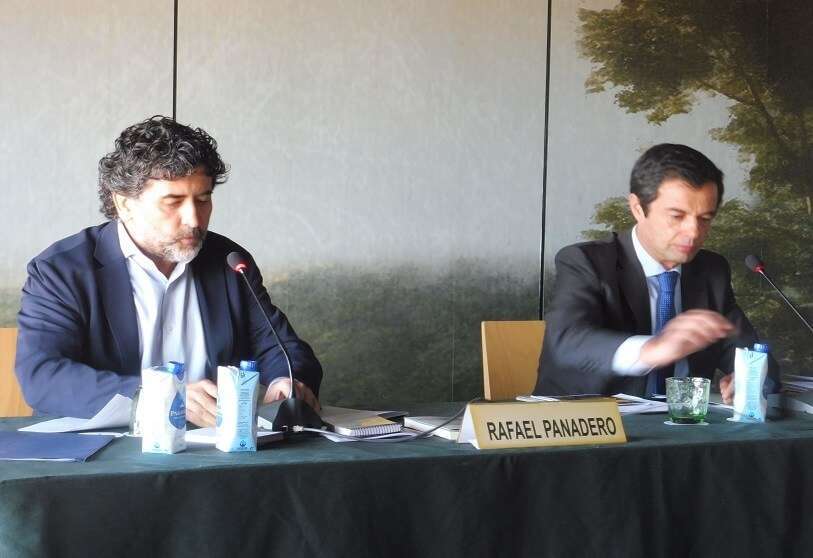
"Vladimir Putin has on several occasions demonstrated his admiration for Peter the Great," Panero stressed, "it is said that he has decorated official rooms with paintings of Peter I." The monarch's imperialist legacy hints at the ambitions of a Putin whose decisions are motivated by imperialist motives. So far, the Russian president has used energy dependence as a weapon, Fallon noted.
In recent weeks there have been voices in the West suggesting not to "humiliate" Russia, such as Macron himself, or talking about territorial cessions, such as the historic US Secretary of State Henry Kissinger. Is this a necessary step to end the war? What should be ceded then? Fallon acknowledged that there are doubts. Raised in the US, but with experience in Russia and China, the analyst conveyed that in authoritarian regimes there is "a lack of bad news" and that the Pivot to Asia doctrine, outlined during the Obama administration, is dead. "The focus now needs to be on the global scale, not on specific regions," Fallon said. Adopt a holistic strategy.
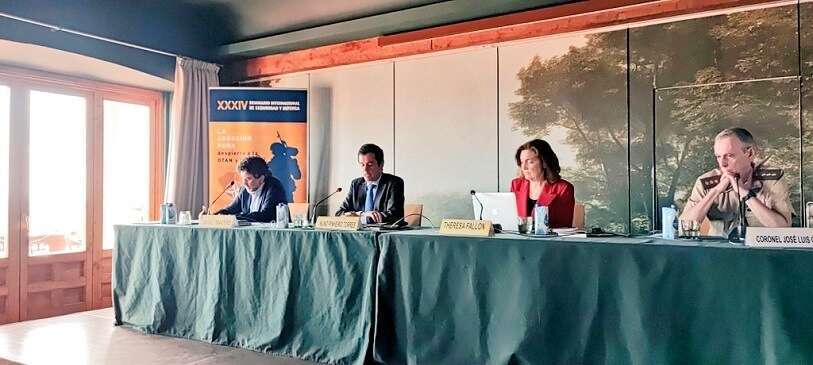
Colonel José Luis Calvo noted the exponential recovery of the Russian Armed Forces from the collapse of the Soviet Union to the present day. From the shortcomings seen in 1994 and 1995 during the first Chechen war under President Boris Yeltsin to the sophistication of Putin's intervention in Syria, preceded by the campaigns in Georgia, the increase in defence spending, the emergence of the Gerasimov doctrine and the occupation of Crimea.
"But there are shadows: the Kremlin's defence budgets do not fit," remarked the chief director of the Security and Defence Studies and Coordination Division. Maintaining such a large army and, above all, the numerous nuclear weapons, entails a massive expenditure of resources. It has been a relative development, according to Colonel Calvo.
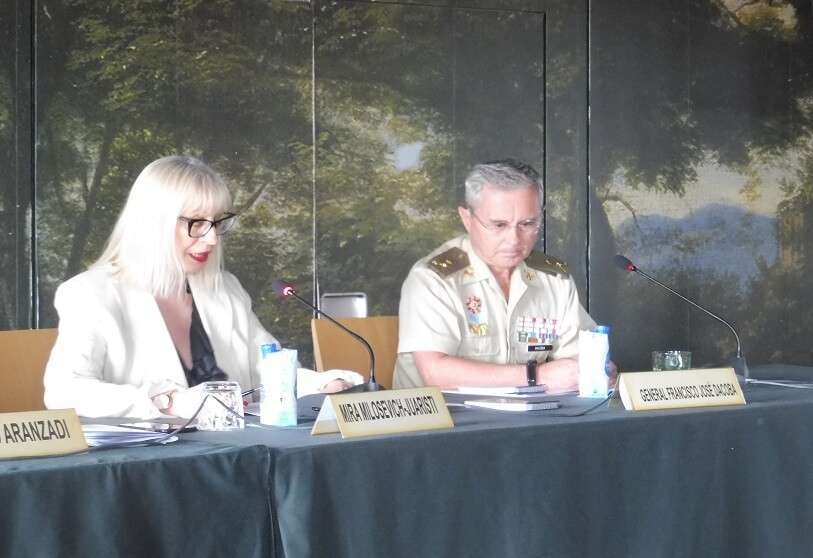
As for Ukraine, the colonel believes it was impossible for them to attack in the way they did. "They didn't have sufficient forces, so I think there was an overconfidence caused by intelligence failures. They mistakenly thought that the government in Kiev was going to collapse". From the first months of complete failure, the war has become a conflict of attrition "reminiscent of the First World War", says Colonel Calvo
The key, for the head of the Security and Defence Coordination and Studies Division, will be for Ukraine to mobilise its forces and integrate external weaponry before Russia occupies and fixes positions, moving to the defensive. As for rapprochement, the colonel believes that "Russia's aggression cannot be rewarded. But there is a contradiction here that may not be: Russia will be there, and dealing with a frustrated and marginalised Russia in Europe could have worse consequences".








